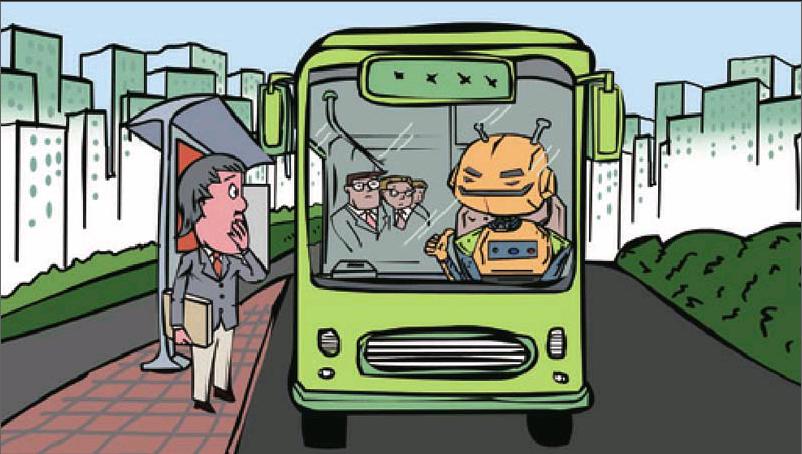Driving the Future
2016-01-21ByBryanMichaelGal
By+Bryan+Michael+Galvan

We are living on the edge of tomorrow—the dawn of a world dominated by Artificial Intelligence (AI). It is a change that is likely to be so thoroughly profound that it is hard to imagine how exactly our world might look like even a few decades from now. Imagine the astonishment of the Wright brothers if they had known that, from their invention of the first successful airplane in 1903, Buzz Aldrin would set foot on the moon just 66 years later. Yet the changes that rocked the world thanks to those achievements in avionics may wither in comparison to what lies in store for future breakthroughs in AI.
Baidu, the Internet search engine giant based in Beijing, recently announced their own bid into the AI sector by launching a new business unit intending to put self-driving cars on the road in the next three years. If things go as planned for the unit, which is currently focusing on research and development, the massproduction of AI-driven transportation will become a new day-to-day reality just five years from now.
Baidu has jumped into the fray of a growing number of prominent global corporations that are pouring vast sums of money, sweat and tears into teaching machines how to learn and make decisions. Toyota, for example, recently announced a $1-billion investment into AI, claiming in a press statement on November 6, 2015 that “artificial intelligence has significant potential to support future industrial technologies and the creation of an entirely new industry.” Google, Tesla and Microsoft have also made headlines in recent years with their endeavors to bring this technology to fruition. So, what does Baidu have to offer that is any different from the competition?
On a highway to excel
China is bursting at the seams with 1.3 billion people, from which a ferocious appetite for cars has grown year after year. This has resulted in sales and production that have “continued to pick up and set new highs” last December, while “substantial growth could be seen,” according to the China Association of Automotive Manufacturers. While this implies a lucrative market for car consumption, Baidu has set its eyes on an unexpected target—public transportation.
Baidus Director of International Communications, Kaiser Kuo, gave some insight into the future of Chinas public transportation during an interview with Beijing Review. Kuo made it clear that Baidus ventures into selfdriving technology wouldnt mirror the efforts of other companies—Googles in particular. “It is quite different in that were working with existing car manufacturers [like] BMW AG and the approach that were taking is going to focus on public transportation and not on private automobiles,” Kuo asserted.
“Were working with different cities around China and we will be able to announce within not too long when we have a city which will first give us a date and a dedicated bus route from which we can then run a fully automated bus on.” Should everything go as planned, Kuo claimed that Baidu can then “expand from there to multiple bus routes within a single city and then eventually to multiple cities [around China].”
While a city full of buses and other sorts of public transport being driven by AI might seem too futuristic, Baidu is already working to make that vision a tangible reality. But if car sales are so promising, why start with buses?
Driving safely
In May 2015, the World Health Organization(WHO) reported that at least 200,000 people die each year as a result of road accidents in China. That means that an average of 23 people die domestically each hour due to a variety of transport-related problems—a shockingly morbid fact. The WHO also urges that “without action, road traffic crashes are predicted to rise to become the seventh leading cause of death [around the world] by 2030.” An often-stated quote claims that a single death is a tragedy, but a million is a statistic. While such large numbers may fail to do justice to the horrors of mass deaths, consider the implication—fatal car accidents are frequent enough to affect you or your loved ones.
Using AI to assist or control driving may just be the solution to the problem. “That is part of the reason why we [are taking] a good approach by using established public bus routes which already have dedicated lanes,” claimed Kuo. “Safety issues are something that we can really [handle] by repeating and training our AI systems to know that route extremely well to be familiar with the possibilities, hazards and whatnot. It is a wise approach.”
Cui Dongshu, Secretary General of the China Passenger Car Association, still had some reservations when Beijing Review asked about the safety of using AI in transport systems. According to Cui, “A self-driving car is too rigid, and cant react to emergencies as flexibly as a human driver.” This is a sticking issue for current AI systems—how can you teach a machine to react to the unexpected? However, Cui conceded that although “it will be a long time for all of the people to accept self-driving transport systems; that will be the future of motor vehicles.”
“Its an ideal goal,” asserted Cui regarding Baidus statement that in 10 years, 80 percent of new vehicles [in China] would have self-driving systems. “Based on current road conditions, it may be realized in some regions, but not nationwide, because a self-driving system is not only a cars function—it also needs to be inter-connected with the road network,” Cui assessed. “In 10 years, a self-driving system might only be in the beginning stages.”
Pandoras box
Although a future filled with intelligent machines may become the pinnacle of human achievement, some renowned individuals have made ominous warnings, reminding us that every peak is followed by a chasm. Stephen Hawking, Bill Gates and Elon Musk have joined the ranks of those cautioning the use and development of AI technology.
“The potential benefits are huge,” claimed Hawking, writing for The Independent in 2014. He claimed that AI could magnify human intelligence, even leading to the eventual eradication of war, disease and poverty. “Success in creating AI would be the biggest event in human history. Unfortunately, it might also be the last, unless we learn how to avoid the risks,” Hawking warned. “One can imagine such technology outsmarting financial markets, out-inventing human researchers, out-manipulating human leaders, and developing weapons we cannot even understand.”
So, while the long-term control of machine intelligence is a cause for concern, the short-term use of AI in transport systems, manufacturing and other labor-reducing applications also creates issues. “On one hand, AI will substitute many laborers, but on the other hand, it will create many new positions,” said Liu Chenglin, Deputy Director of the Institute of Automation at the Chinese Academy of Sciences.
According to Kuo, the loss of livelihoods due to AI is a valid point. “We are going to see a lot of low skilled jobs disappearing,” he speculated. “So it is important to deliver new skills to people, to train—that is why Baidu is focusing so much on online education,” making reference to Andrew Ng, Baidus chief scientist. Ng, whose main area of research is machine learning, is also the co-founder of the online learning platform Coursera.org.
Using machines to assist in learning may not be a new idea, but the use of AI has revolutionary implications for the current education system. Also, if more menial labor jobs are given to machines rather than humans, as has been the trend since the use of the assembly line put in place by Ford in 1913, humans may have more time to learn and create. Liu disagreed though, stating that “the downside [to AI] is that humans may become lazier.”
The next few years will surely herald drastic changes to modern day technology, healthcare and society thanks to AI and other advancements on the horizon. One needs only to look back 100 years ago to see shocking levels of development compared to today. Generations to follow will look back on the times we are living in and point out the emergence of greatness—but at what costs? As Kuo cautioned, “this is peoples lives we are talking about.” These are the questions we must ask ourselves now, to mitigate negative consequences and to enhance the benefits to come.
